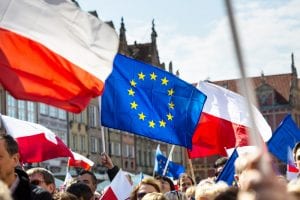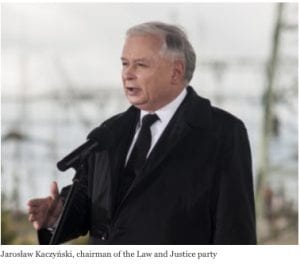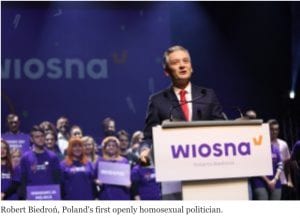Home and away
This year’s election season in Poland resembles an all-Polish semi-final match in the UEFA Champions League (which is something that never happened, by the way). Two Polish archrival teams are set to play each other twice within a span of 5 months. The away match comes first, on 26th of May, when Poles cast their votes in the European Parliament elections. The rematch at home, which is the Polish parliamentary election, will take place in the  autumn, before 11th of November.
autumn, before 11th of November.
This is the fourth European Parliament election for Poland after it joined the EU on 1 May 2004. Never before has this voting carried such a load of political significance. Political pundits and the Polish media are in unison in calling it the most important test for all major political forces in the country before the final round in November. For the first time in Poland’s history the Euro-elections may determine whether the ruling party (PiS, Law and Justice) goes on a downward trend or whether it is strengthened on its way to the second 4-year term.
Turnout is the key
In Poland voter turnout is viewed as a key to all political analyses. Recent polls show that as many as 52% of eligible voters indicate their intent to take part in the upcoming European election. This is a sign that a temperature of the public debate is high and that polarized electorates are ready to engage. The real turnout is likely to be lower, closer to 40%, but still much above the lowest record set in 2004 – 20.9%. The results for 2009 and 2014 were equally unimpressive, with 24.53% and 23.83% respectively, yet this year is promising to be much different.
The local government elections held in October 2018 were decided by 55% of eligible voters, the best score in the history of local elections. High attendance, especially in cities, always helps the liberals and the progressive left, who are now in the opposition. To increase voter participation and to stand a chance against PiS, they are now running jointly under the banner of the European Coalition (KE). This group brings together pro-European political parties that joined forces at the initiative of former leaders from the Civic Platform (PO) and SLD, the Left Democratic Alliance. For fear of missing out Zieloni (the Green party), Nowoczesna (the Modern party) and PSL (Polish People’s Party) joined the Coalition in February. Each of these parties, with the exception of PO, have been long stuck in electoral niches with a little chance of turning things around for themselves.
PO’s war with PiS
The current campaign is yet another chapter in a decade-long conflict between Poland’s two political camps, PO and PiS. In recent years, the Civic Platform, founded by Donald Tusk, has been no match for the party of Jarosław  Kaczyński. Since 2015, despite many problems abroad, PiS has enjoyed a stable level of public support within the 40% threshold while PO couldn’t even reach 20%. Forming the anti-PiS alliance under the rebranded flag of the European Coalition is the only chance for PO to defeat its main adversary. Even a marginal victory in May will deliver a first-leg advantage to the winning party. Latest polls show that the European Coalition and PiS are now competing side by side and the continuous polarization of the society works in favor of both rivals.
Kaczyński. Since 2015, despite many problems abroad, PiS has enjoyed a stable level of public support within the 40% threshold while PO couldn’t even reach 20%. Forming the anti-PiS alliance under the rebranded flag of the European Coalition is the only chance for PO to defeat its main adversary. Even a marginal victory in May will deliver a first-leg advantage to the winning party. Latest polls show that the European Coalition and PiS are now competing side by side and the continuous polarization of the society works in favor of both rivals.
The European elections are also the best opportunity for the opposition to mobilize the pro-European, anti-PiS voters, who often show symptoms of EU-induced complacency. If PiS sends a strong anti-EU message, the urban, well-educated, well-off liberal voters will show up at the ballot box. If PiS proves soft in its Euroscepticism, many of them will remain passive. This leaves room for others to step in, such as the Confederation of Janusz Korwin-Mikke, a controversial Polish MEP known for his scandalous statements, disrespect for women and the phrase “and the EU should be destroyed” used as the conclusion to all his speeches. The anti-EU electorate remains small in Poland, but it is loud and determined to put the cat among the pigeons.
At the start of the year, Poles also witnessed a launch of a new, progressive, social democratic, pro-EU party called Wiosna (Spring). It is led by Poland’s first openly homosexual politician, Robert Biedroń. Wiosna sprang into third place in the polls and Biedroń will run from Warsaw only to run again for the Polish Parliament in the autumn. The challenge for Wiosna is to be able to catch the wave of success in May and ride on it until November.
European elections, local agenda
Law and Justice is not ready to yield its hard-won control of the state and its institutions. Its strategy is to polarize the campaign around issues not related to European elections, such as LGBT rights, protecting children from “sexualization” and new social spending programs of the PiS government. Law and Justice did not wait with making promises until autumn. Jarosław Kaczyński, the party’s mastermind, decided that without a good result in the European election, the result of the national election is at risk.
 Kaczyński’s goal is to improve the party’s result from 2014, when PiS won 19 seats in the European Parliament. Now, the party is hoping to win two more and to find new coalition partners in Europe, which would make the European Conservatives and Reformists a stronger force in Brussels. Earlier this year, Kaczyński met with Italian deputy prime minister Matteo Salvini and Santiago Abascal, the leader of Vox, the Spanish nationalist group. After the British MEPs leave the European Parliament, Kaczyński hopes that PiS can lead the ECR, now strengthened with newly elected populists from Italy and Spain.
Kaczyński’s goal is to improve the party’s result from 2014, when PiS won 19 seats in the European Parliament. Now, the party is hoping to win two more and to find new coalition partners in Europe, which would make the European Conservatives and Reformists a stronger force in Brussels. Earlier this year, Kaczyński met with Italian deputy prime minister Matteo Salvini and Santiago Abascal, the leader of Vox, the Spanish nationalist group. After the British MEPs leave the European Parliament, Kaczyński hopes that PiS can lead the ECR, now strengthened with newly elected populists from Italy and Spain.
Political horse-trading
The process of allocating party candidates on electoral lists is always a testimony to the party’s capabilities and determination in scoring a victory with the voters. The list of PiS candidates running from pole positions in different regions came as a surprise to many. There are 5 cabinet ministers, 6 deputy ministers, deputy speakers of the upper and lower houses of the Parliament. It is a very strong group of active politicians who would depart the local political playground. Their “evacuation” to Brussels is, according to some, a sign that PiS is expecting a loss of power. Others believe that by putting forward strong players, PiS shows it won’t give up on the Euro-elections. There are also many well-known names on the EC lists, but most of them are “political pensioners”.
Media in Poland have begun speculating which future Polish MEPs have a chance in the run for the European Commissioner’s seat. Candidates include Anna Fotyga, former Minister of Foreign Affairs and several MEPs: Karol Karski, Zdzisław Krasnodębski, Ryszard Legutko and Jacek Saryusz-Wolski. Konrad Szymański, Deputy Foreign Minister for European Affairs, and Jerzy Kwieciński, Minister of Investment and Economic Development, are also listed. These two experienced government officials would surely feel comfortable walking through the hallways of the European Parliament. The European Coalition, on the other hand, did not announce any candidates. One can assume such persons will need the PO seal of approval.
Before the first whistle
During the long, grueling 2019 election season there is little time for Polish politicians to rest and recuperate. Two major teams are already training hard before the May duel. Young hopefuls will gladly retire the old champions, but it’s not so easy to build a loyal fanbase. Many in Poland believe that the first leg clash in the European election will decide who raises the final trophy in November. Whether you support one of the above teams or not, we invite you to watch the spectacle.